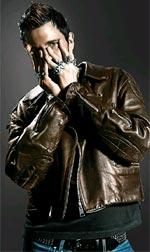Simon Hobart was born in September 24, 1964. He raised in Hemel Hempstead (UK) and at 16 left comprehensive school and moved to London. His interests were focused on the capital's eccentric night-club scene and began devout regular at the infamous Blitz club presided over by Steve Strange. Simon adopted the New Romantic/Goth dress code of the time.
In November 1981 he got his first DJ-ing gig at the Kareba club, then in June 1983 opened his own first club, the Fly Trap. Each Saturday he would shop at Jane Kahn’s outrageous dress shop in King’s Road, and eventually had a part-time job there.
In February 1984 Simon founded the KitCat club (named after the club in the film Cabaret), which was intended to have a "goth-gone-glam" feel. A year later a photo of him in full goth regalia was splashed across the front page of the tabloid The Sun, above the caption "Godfather of Goth". 200 police dressed as goths descended upon the premises, he got away with community service and the club became wildly popular.
It was around this time that he was singer for Red Lipstique, a band which had a club-hit with the single "Drac's Back" (a cover of a track by Andy Forray). Simon wrote and sang the track "A different kind of love".
They're easy pickin's at the discotheque I leave them feeling like they've been in a wreck You know they wake up all wasted And they never ever check Those two small holes that I leave in their neckWell if they were wise They would soon realize They're not hung over They're just vampir-ized 'Cause Drac's BackI wanna suck your..(oooh.. Dracula!) Drac's back...
The KitCat survived until 1989, and Simon then started the rock-oriented Bedrock at Oxfords nightclub. He promoted the club's opening night by not letting anyone in, forcing them in a long queue outside, but blasting the music and pretending it was packed to capacity inside. There was immediate buzz about the new, "wildly successful" indie dance night. His growing reputation led to DJ residencies at Heaven’s Pyramid and Rage, and in the early 1990s opened two drum’n’bass nights, Fusion and Vivid, both having capacities of about 1200 people.
In May 1995, capitalizing on the popularity of Britpop, Simon started his first indie gay night, Popstarz. It became his most successful creation, and more than a thousand patrons a week continue to arrive each Friday. Many celebrities have partied there (Mick Jagger, Boy George, Matt Lucas, Bono, Siouxsie Sioux and Neil Tennant) and it has been host to many world-class bands, including Scissor Sisters, The Dandy Warhols, Le Tigre, and Goldfrapp.
In more recent years, inspired by the success of Popstarz, he took over a basement dive in Soho behind the Astoria and transformed it into the Ghetto and launched a series of alternative nights, Nagnagnag, Redeye, The Cock, Misshapes, Wig Out and more. Simon spent six nights a week there, welcomed punters stationed in the little booth at the bottom of the stairs. His last venture was Trash Palace, an old Chinese restaurant on Wardour Street he turned into an attitude-free, yet stylish Soho drinking spot, with its red sofas and black floors (same art-school look as Popstarz and Ghetto).
Simon came out to San Francisco and guest DJ'd at the very first Shadowplay in May 2002 and returned there in June 2003 to DJ at the first Shadowplay Stage at the SF Gay Pride festival.
In 2003, The Observer named Simon Hobart as one of the 20 most influential gay people in Britain.
Simon, suddenly died in the early hours of a cold Sunday October 23, 2005 after falling from steps outside his flat. Simon Hobart's family have announced that his clubs will stay open, "run in the manner and style that Simon wanted". All profits in future will be donated to Macmillan Cancer Relief, a charity for which he had done stalwart fund-raising since the death of his dearly beloved mother from cancer in 2001.
